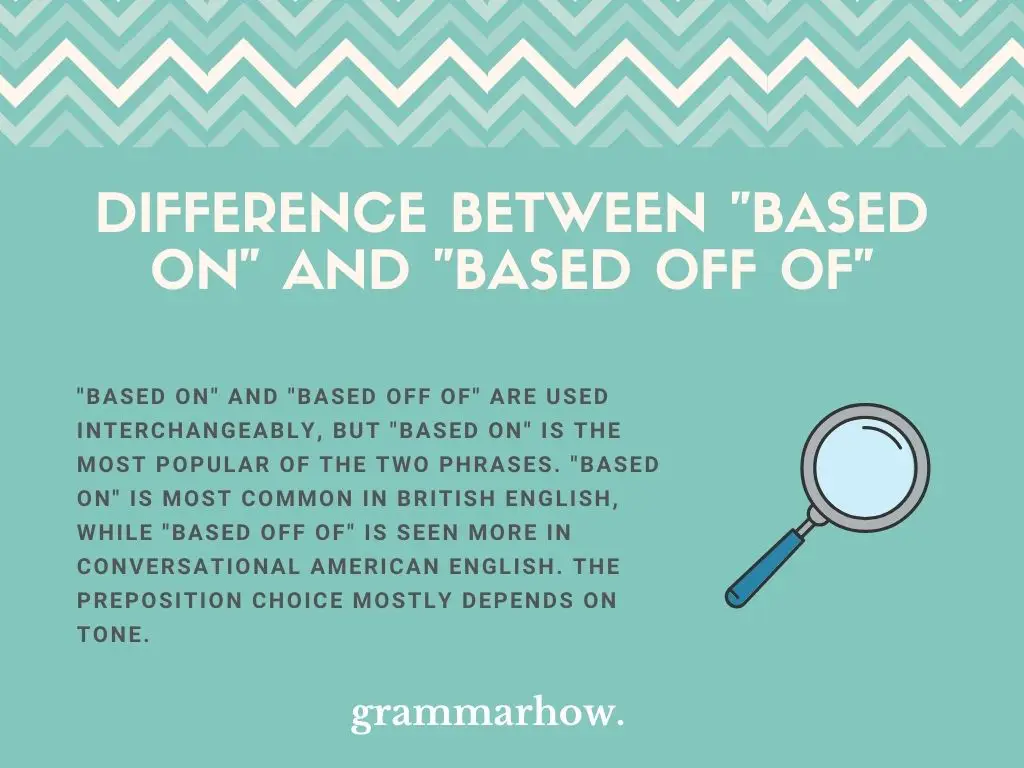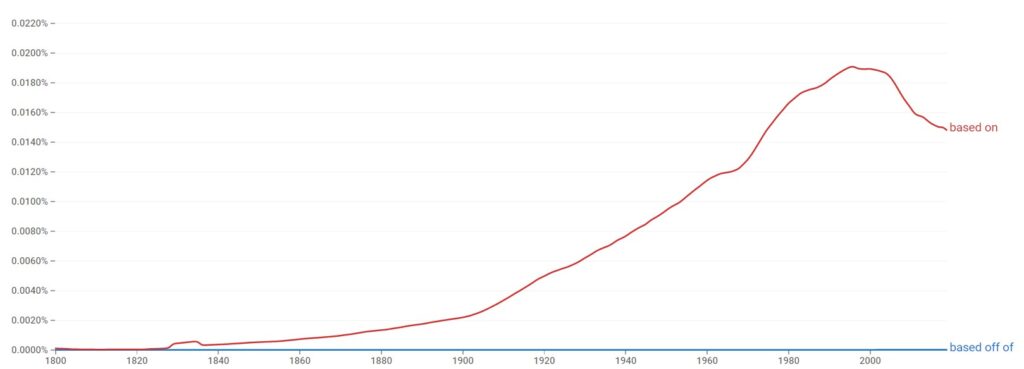When we’re using the phrases “based on” and “based off of,” you might be wondering about any differences between the two phrases. However, there isn’t as much difference as you might think, but let’s look at that in this article.
What Is The Difference Between “Based On” And “Based Off Of”?
“Based on” and “based off of” are used interchangeably, but “based on” is the most popular of the two phrases. “Based on” is most common in British English, while “based off of” is seen more in conversational American English. The preposition choice mostly depends on tone.

If we refer to The Cambridge Dictionary, we can find a good meaning for what it means when something is “based on” something else. It means that “if you base something on facts or ideas, you use those facts or ideas to develop it.”
Let’s look at this graph for some more detail. This shows us how we use the two phrases comparatively in literature. As you can tell, the phrase “based off of” isn’t a popular choice at all. In fact, it isn’t used at any point in history enough to climb off of the “zero” mark on the graph.

“Based on” is by far the most popular choice. This extends to all measures of written literature, both British and American English. It’s only in conversational American English where you might hear the words being used.
Example Usage
We’ll show you some good examples now to see how they’re both used in action. This way, you’ll be able to start using them yourself.
Since they’re both interchangeable, we’ll include the same sentences twice, though each one will use a different preposition based on who is saying it.
- This documentary is based on the serious issues our world faces.
- This documentary is based off of the serious issues our world faces.
- This television show is based on real events.
- This television show is based off of real events.
- What information are you basing that on?
- What information are you basing that off of?
- We’ve got an idea that we’d like to base on you as a role model.
- We’ve got an idea that we’d like to base off of you as a role model.
- You’re much better at basing your problems on real issues.
- You’re much better at basing your problems off of real issues.
- We should base our work on what drives us.
- We should base our work off of what drives us.
As you can see from these examples, sometimes, a few words might come between “base” and the preposition we’re using. This is okay, and the meaning is still important, but “base our work on” and “base on our work” are usually the same thing; it just depends on the sentence structure, which makes more sense.
Still, it’s important to note that “based on” and “based off of” are very similar and interchangeable in just about every way. You can use whichever one you’d like to, but generally, “based on” is the more grammatically correct variation. You should avoid “based off of” unless you’re in a casual setting.
Also, when you use “based off of,” make sure you use “of” after “off.” You need the preposition for it to make any sense. The phrase “based off” is still used casually, but it’s grammatically incorrect and should be avoided.
Why Do Americans Say “Based Off Of”?
It’s common for Americans to say “based off of” more than it is for British people to use it. There isn’t an exact correlation as to why this might be the case. Usually, it’ll be because of a development over time of the language or a reason to stray away from the original “mother tongue” that is British English.
Why Is “Based Off” Wrong?
While “based off” is still used in a colloquial and conversational sense, that doesn’t mean it’s correct.
The preposition “of” is meant to be used just like “based on” using the preposition “on” to let someone know what is “based.” We need to include “of” as a preposition; otherwise, we’re not setting the sentence up to be grammatically correct.
Without a preposition, the sentence falls apart. Generally, the preposition is what we use to continue on to the next clause. Look at these examples:
- This is based off of my life.
Here, we’re seeing that something is “based off” someone’s “life.” That’s where “of” comes in, to group these things together to make it easier for the reader to comprehend.
- This is based off my life.
While this is a common saying that many American English users will say, it doesn’t make it correct. There isn’t anything to base the life on because we’re not including the preposition “of.”
Is “Based Out Of” Correct?
Sometimes, you might come across a similar saying which is “based out of.” While this saying is correct, it isn’t synonymous with the other two and is only used in a specific situation.
“Based out of” is correct when you want to say where somebody is based in the world. Generally, it’s used to talk about military bases and where certain things will be coming from.
If you need an example to help you understand that, here’s a good one:
- The drones are based out of France.
- We are based out of Mexico.
Here, we can see how things and people can be “based out of” a place, meaning they come from that place, even if they’re not currently there.
What Is The Meaning Of “Based On”?
“Based on” means that something is developed from an original idea. We often use it to talk about closely linked stories or related to other familiar stories we might have heard.
Let’s go through some examples to help you understand the most common things that might be “based on” something else.
- The messages in this episode are based on real events.
- I’ve based this homework assignment on my own life.
- I’d like to base my work on you.
Generally, when we talk about a “base,” we’re talking about something that is underneath something else. This means that you’d place something “on” a base. That’s why “on” is the most acceptable preposition after it.
What Is The Meaning Of “Based Off”?
“Based off” is an incorrect way of using “based off of” in a sentence. It has the same meaning of “based on” but should only ever be used in spoken and colloquial English. It is considered grammatically incorrect if used in writing.
With “based off,” we can only use it in speaking (it’s most common in American English). We thought we’d throw together some similar examples as you’ve read above to help you with this one:
- These stories are based off my life.
- I’ve based my career off my father’s teachings.
- We’ve based our team colors off the flag.
As you can see, it’s not quite as easy to flow in a sentence. “Off” is the opposite of “on,” which is why it’s so incorrect to use it in this sense. We have to follow it with a preposition if we’re going to use it in this way.
What Is The Meaning Of “Based Off Of”?
“Based off of” is synonymous and interchangeable with “based on” and is most common in American English. It means that something is related to another story or piece of information and developed because of it.
Let’s go through a few examples of what we mean by this:
- This story is based off of my life choices.
- My school work is based off of what the teacher told me.
- Your ability to perform is based off of what your parents teach you at home.
As you can see, these examples are a little wordier than simply using “based on.” Again, this is a colloquial saying and shouldn’t be used in more formal settings.
You may also like: Is “Off Of” Grammatically Correct? Explained With Examples
What Is The Meaning Of “Based Upon”?
“Based upon” means the same thing as “based on” but is less common to use. It’s the last preposition we would like to show you.
We use “based upon” in the same manner as “based on.” However, the inclusion of “up” before “on” makes it slightly harder to say, and therefore makes people less likely to use the phrase. Still, let’s look at some similar examples:
- These events are based upon real happenings.
- This castle is based upon historical findings.
- We base our work upon everything we find out here.
As you can see, all of these prepositions have the same meaning; some are just more common than others. The correct form to use is “based on” and should be the only one you use in more formal situations.
However, if you’re using American English more commonly than British English, then it might be more acceptable for you to use “based off of” when you’re talking to friends or colleagues.
Either way, in spoken English, not many native speakers will know the difference and won’t call you out if you accidentally end up using the wrong preposition form.

Martin holds a Master’s degree in Finance and International Business. He has six years of experience in professional communication with clients, executives, and colleagues. Furthermore, he has teaching experience from Aarhus University. Martin has been featured as an expert in communication and teaching on Forbes and Shopify. Read more about Martin here.
